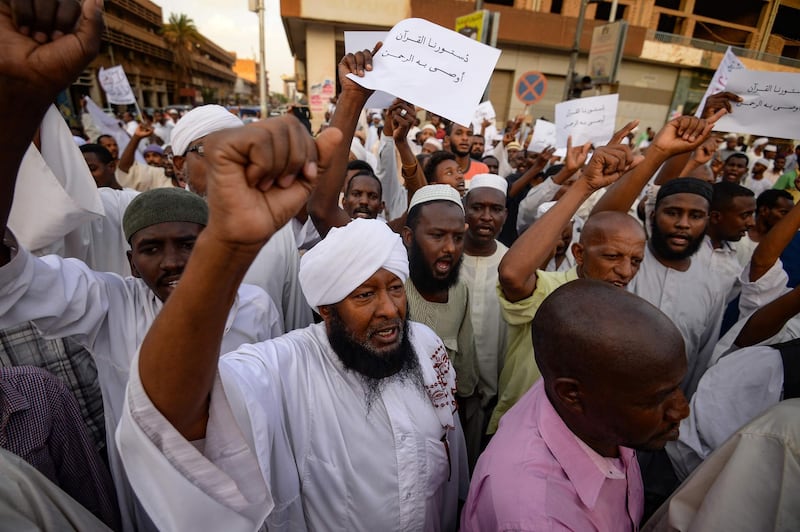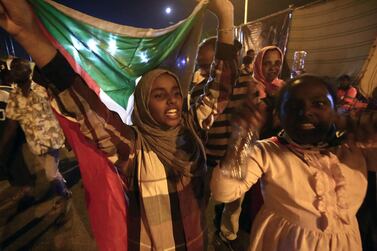Talks between Sudan's ruling military council and protesters are set to resume, its generals announced Saturday as Islamic movements rallied for the inclusion of Sharia in the country's road map.
The resumption of talks with the Alliance for Freedom and Change, the umbrella protest movement that brought down longtime leader Omar Al Bashir last month, comes following pressure from key world powers to get back to the table.
The ruling military council announced "the resumption of negotiations with the Alliance for Freedom and Change on Sunday".
The generals and protest leaders had been expected to come to an agreement on Wednesday on the thorniest issue – the make-up of a new body to govern Sudan for three years that would replace the existing military council that took power after ousting Mr Al Bashir.
But that meeting never took place and on Thursday the head of the military council, General Abdel Fattah Al Burhan, confirmed talks were suspended for 72 hours.
Demonstrators subsequently spent hours meeting Gen Al Burhan's demand to dismantle roadblocks which had paralysed parts of the capital.
World powers on Friday urged the generals to resume the talks.
Representatives from the United States, the United Nations, African Union and European powers called on both sides to "reach an agreement ASAP on an interim government that is truly civilian-led and reflects the will of the Sudanese people," Tibor Nagy, the US assistant secretary of state for Africa, tweeted on Friday.
The generals have allowed protesters to maintain their sit-in outside the army headquarters in Khartoum, where thousands are camping to demand a rapid transition to democracy.
Prior to suspending the talks the two sides had agreed on several key issues, including a three-year transition period and the creation of a 300-member parliament, with two-thirds of members from the Alliance of Freedom and Change.
Ahead of talks resuming, Sudanese Islamist movements held their own demonstration outside the presidential palace in Khartoum on Saturday.
Hundreds of protesters took part in the demonstration, the first by Islamist groups since Mr Al Bashir's removal in April.
"The main reason for the mobilisation is that the alliance is ignoring the application of Sharia in its deal," said Al-Tayieb Mustafa, who heads a coalition of about 20 Islamic groups.
"This is irresponsible and if that deal is done, it is going to open the door of hell for Sudan," he said before the rally.
Mr Al Bashir came to power in an Islamist-backed coup in 1989 and Sudanese legislation has since been underpinned by Islamic law but activists say that during his regime Sharia was applied inconsistently.
Over the years this led to thousands of women being flogged for "indecent behaviour", women's rights activists said.
The protest movement has so far remained silent on whether Sharia has a place in Sudan's future, arguing that its main concern now is installing a civilian administration.
The protest movement brings together a wide range of political, social and also rebel groups from the country's conflict zones, which some say triggered perceptions that it is pushing for building a new secular Sudan.
"Islam is part and parcel of the identity of the majority of the people of Sudan," Sadeq Al Mahdi, Sudan's main opposition leader and an ex-premier, said in a recent interview.
He said it was a "great mistake" for some members of the opposition to "talk about secularism".
Scores of worshippers on Friday staged spontaneous demonstrations in Khartoum after the weekly prayers and criticised the protest movement.
"The Alliance for Freedom and Change wants ... to build what they call a new Sudan, a Sudan without religion, a secular Sudan," said hardline cleric Abdelhai Yusef in his Friday sermon, according to a video posted on his Facebook page.
"That's why we say no, a thousand times no to this deal. We want a Sudan that is for everyone."






